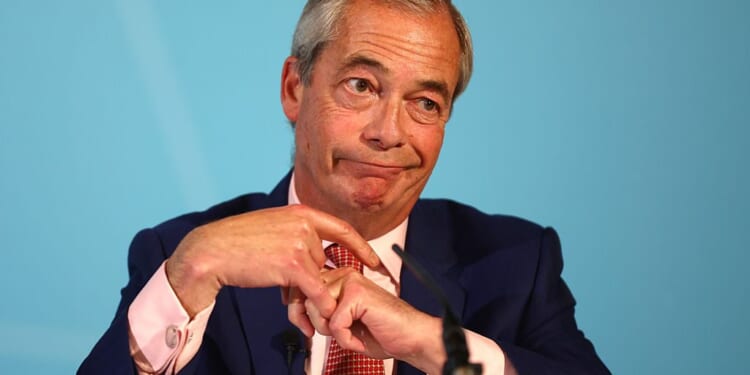There is a strange, disconcerting consequence to thinking about progressivism. You start to see it everywhere, in the most banal assertions and asides, including from people who are assertively anti-progressive.
You hear it in the friend talking of how public figures they loathe will “inevitably” fall from grace. You read it in writers’ pronouncing about how “future historians will say” whatever they fervently believe right now. And you detect it in talk of how certain things are “outdated” or “not relevant” to “the modern era”: invariably an excuse for the powerful to consign things they dislike to the Dustbin of History.
These assertions all relate to time in a particularly progressive manner: as a vehicle of improvement. This means that, by definition, the future will be better than the past; that which is of the past — and therefore not modern — does not belong and must be removed. Time appears to this progressive style not merely as a succession of moments taking us from one minute to another, but as a redemptive force, clearing out what is wrong in the world and bringing in what is right: newness, change.
Crucially, the idea also gives an exalted role to the person who understands progressivism: the wannabe theorist who claims to understand the sweep of history, seemingly without temporal or geographical limit. He — and it is normally a he — knows how social improvement comes about. He knows what needs to be promoted and eliminated in order for History to move forward. And anyone can take on this role if they get the style right.
This is the case even for those who stand on the anti-progressive side of our culture wars. Earlier this year, the political scientist Eric Kaufmann unveiled the “Buckingham Manifesto for a Post-Progressive Social Science”. It argues for a “critical approach to progressive social science’s ‘critical’ claims”: including those which relate to systemic racism, sexism, heteronormativity. Progressivism, as Kaufmann has put it, is “synonymous with the hybrid ideology of Left-modernism”, which is located at the overlap of expressive individualism (including avant-garde modernism), cultural egalitarianism and humanitarianism. It is “more Lennonism than Leninism”, he writes, but it is on the wane.
The manifesto is a serious attempt to redirect Western intellectual life, proposing, as Kaufmann puts it, “a reunification of grand theory with positivist social science”. However, this idea of “a Post-Progressive Era” immediately set my progressive radar off. For it presents the intervention both as political (a new initiative seeking to win support) and as sociological analysis: an assertion that what is desired is in fact happening, that history itself is moving in the way proposed.
Besides the Lennon-to-Leninist kind, there is another powerful strain of progressivism in our culture which I think is reflected in Kaufmann’s paper: the Protestant-inflected liberal idea of progress. This form is generally less invasive than “Left-modernism”, albeit it served to justify British imperial expansion and the conquering of North America. Its narrative of ever-rising freedom and prosperity, summed up by Herbert Butterfield as “the Whig Interpretation of History”, first appeared most obviously in Britain before becoming a foundation myth of the new United States.
It has faith in history rather than gripping it by the throat. And it has also tended to trust in power, vesting particular faith in economic power: thereby serving as an Establishment ideology.
A century ago, in his defining tome The Idea of Progress, J.B. Bury referred to progress as “the animating and controlling idea of western civilisation”. He added: “The phrase CIVILISATION AND PROGRESS has become stereotyped, and illustrates how we have come to judge a civilisation good or bad according as it is or is not progressive. The ideas of liberty and democracy, which have their own ancient and independent justifications, have sought a new strength by attaching themselves to Progress… Socialism, at an early stage of its modern development, sought the same aid.”
The progressive style of supporting its desires with predictions certainly gives any creed or proposal a little extra oomph, invoking social power as well as right. This creed isn’t just right but is going to win, the message goes, so you had better get on board or face the consequences. History as progress therefore ends up mobilising interest perhaps better than any other form of assertion that doesn’t invoke God.
And so we find thinkers and politicos almost reflexively putting themselves and their ideas forward not just as desirable but inevitable: they are not just right, but destined to win. And this is so not just on the progressive Left. Donald Trump has always done this, presenting himself as the ultimate winner in the American style. Nigel Farage tries to emulate him in a more eccentric English manner. Islamists do it too. The Labour peer Lord Glasman, a prominent anti-progressive, recently said of his opponents in the party: “I think their time is gone… It’s changed”: assuming, perhaps, that we have indeed entered a new post-progressive era.
The terms “post-liberal” and “post-liberalism” tap into the same sort of energy. C.B. MacPherson proposed a “post-liberal democracy” as far back as 1964, to push back against liberalism’s anti-democratic tendencies. More recently, John Gray and David Goodhart have invoked it in their writings, as have Catholic thinkers such as Patrick Deneen and Adrian Vermeule. However, as with “post-modernism”, there is an inherent dualism to post-liberalism. Both terms suggest a change, away from modernism or liberalism, as well as implying that this change is occurring or will occur afterwards, later in history. They represent both proposal and prediction, even the statement of historical fact. And post-liberalism is or will be better, more suitable to the times.
In other words, the progressive mindset is so deeply ingrained in Western culture that even anti-progressives show elements of it. It is as if we need to certify our opinions and desires with the findings of sociology and historical analysis to make them somehow valid in a scientific style. It shows a lack of confidence in ourselves and our species: that the society we want, the life we want, who we are, requires “independent” blessing by the forces of history to become real. And the adoption of this style as a social currency leaves us vulnerable to those who are more able to mobilise the forces of social and historical analysis, in academia and other sites of knowledge production: places that remain pretty much dominated by what Kaufmann calls “Left-modernism”.
“The progressive mindset is so deeply ingrained in Western culture that even anti-progressives show elements of it.”
The temptation is to imitate their techniques. However, the style only really works for those with power to hand, with the baubles and titles, the nomenclature of “expertise”. Notwithstanding how they are linked to change, progressive assumptions serve to justify existing power: offering it a bit of magical authority, with its specialised knowledge of the future.
There is another way, if we are prepared to think, in the frank embrace of politics as politics, to return to what J.B. Bury called the “ancient and independent justifications” of liberty and democracy, justifying measures by what we or the people want (and don’t want): returning to human agency as a legitimate source of political action. Moreover, such a style of thinking would embrace truth in a way that progressive historicising claims to, but falls short of.
Nevertheless, we should admit that there is something in the air: some sort of genuine historical change going on: a passing from one era into another, perhaps. During Trump’s first presidency and 14 years of Conservative-led government in Britain, Left-liberal hegemony was barely touched. Indeed, it seemed to get stronger in some respects. But there are some signs of change now, positive change in certain respects, suggesting a possible new era both for intellectual life and for politics and society more broadly.
A true “post-progressive era” would be something different though, requiring a huge change in the way we think and see the world. It is intriguing to think about how it might look. However, for the moment, we must admit that it is a long way off, that progressivism remains in our existential bloodstream, whichever way we turn: that we are all progressives, really.

















